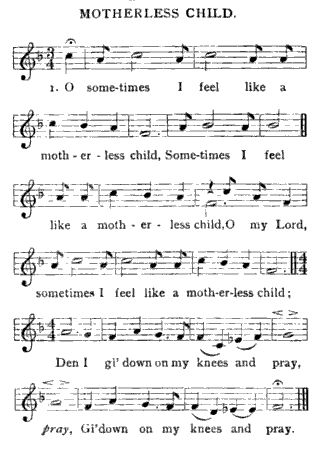Sometimes I Feel Like a Motherless Child

"Sometimes I Feel Like a Motherless Child", also "Motherless Child", is a traditional Negro spiritual. It dates back to the era of slavery in the United States. An early performance of the song dates back to the 1870s by the Fisk Jubilee Singers.[1][2] Commonly heard during the Civil rights movement in the United States,[3] it has many variations and has been recorded widely.
Description[]
The song is an expression of pain and despair as the singer compares their hopelessness to that of a child who has been torn from their parents. Under one interpretation, the repetition of the word "sometimes" offers a measure of hope, as it suggests that at least "sometimes" the singer does not feel like a motherless child. [4]
Renditions[]
Multiple recordings of the song were made by Paul Robeson, starting in 1926.[5]
Bessie Griffin and The Gospel Pearls recorded the song on their album in 1960.[6][7]
Odetta performed the song at Carnegie Hall on April 8, 1960. The song was included on her album, Odetta at Carnegie Hall the same year.[8] This version was part of the soundtrack of Pier Paolo Pasolini's The Gospel According to St. Matthew (1964). Mary Travers performed the song on Peter, Paul and Mary's album: A Song Will Rise (1965) and on Milt Okun's album: Something to Sing About in 1968. Esther & Abi Ofarim recorded the song for their album Das Neue Esther & Abi Ofarim Album (1966). Richie Havens performed a historical rendition of the song – retitled Freedom (Motherless Child) – on August 15, 1969 at the Woodstock festival (opening for the festival).
Maki Asakawa recorded the song for her debut album The World of Maki Asakawa (1970).[9]
Thea Bowman, a Black Catholic religious sister, recorded the song in 1988 for the stereocassette, "Songs of My People". She then sang it at a meeting of the United States Conference of Catholic Bishops the next year, shortly before her death from cancer, while giving a speech on Black Catholic history and experience. The studio recording was re-released in 2020 for the 30th anniversary of Sister Bowman's death as part of the digital album, Songs of My People: The Complete Collection.
Boney M. recorded a disco version of the song titled "Motherless Child" on their 1977 album Love for Sale with singer Liz Mitchell taking the lead vocal. Liz had previously recorded the song as part of Les Humphries Singers in 1971.
Martin Gore recorded his rendition of the song (titled only Motherless Child) on his 1989 EP Counterfeit.
Prince performed his rendition of the song at many concerts beginning in 1999.[10][11] Soprano Barbara Hendricks sang it when she received the 2002 Prince of Asturias Award for the Arts.[12] John Legend sang the song during the Hope for Haiti Now: A Global Benefit for Earthquake Relief telethon in 2010. The song is also included on his 2004 album, Solo Sessions Vol. 1: Live at the Knitting Factory.[13]
References[]
- ^ "Blue Gene" Tyranny, "Sometimes I Feel Like a Motherless Child" article, Allmusic
- ^ Barton, Hymns of the Slave and the Freedman, p.17 ("Not very long ago I attended a concert given by a troupe of jubilee singers, whose leader was a member of the original Fisk company. Toward the end of the programme he announced that a recently arrived singer in his troupe from Mississippi had brought a song that her grandparents sang in slave times, which he counted the saddest and most beautiful of song of slavery. It was a mutilated version of Aunt Dinah's song ['Motherless Child' or 'I feel like I'd never been borned.']")
- ^ McGill, Ann. "Music of the Movement: A Lowcountry gospel singer explains the songs of the Civil Rights era". Live 5 WCSC. Retrieved 2020-03-13.
- ^ *"Sweet Chariot: the story of the spirituals" Archived 2007-01-09 at the Wayback Machine by Arthur C. Jones
- ^ "Paul Robeson - Sometimes I Feel Like A Motherless Child /On Ma Journey". Discogs. Retrieved 2019-11-10.
- ^ "Bessie Griffin And The Gospel Pearls - Portraits In Bronze". Discogs. Retrieved 2020-03-13.
- ^ Lipsitz, George (1997). Time Passages: Collective Memory and American Popular Culture. U of Minnesota Press. ISBN 978-1-4529-0578-5.
- ^ Odetta - Sometimes I Feel Like a Motherless Child, archived from the original on 2021-12-14, retrieved 2020-03-13
- ^ "Maki - 浅川マキの世界". Discogs. Retrieved 2021-01-14.
- ^ "Watch Prince Shred His Guitar On 1999 Spanish Television Show". L4LM. 2016-05-04. Retrieved 2020-03-13.
- ^ McDermon, Daniel (2017-04-20). "5 Live Prince Clips Worth Watching (While You Can)". The New York Times. ISSN 0362-4331. Retrieved 2020-03-13.
- ^ "Barbara Hendricks, Premio Príncipe de Asturias de las Artes 2000". YouTube. Archived from the original on 2021-12-05.
- ^ Rodriguez, Jayson. "John Legend Sings 'Motherless Child' On 'Hope For Haiti Now' Telethon". MTV News. Retrieved 2020-03-13.
External links[]
- Lyrics as by J. W. Johnson & J. R. Johnson (1926) at negrospirituals.com
- Art of the States: Piano Sonata No. 4 musical work quoting the spiritual by African-American composer George Walker
- Sometimes a 1976 work for tenor and tape by Olly Wilson, based on the spiritual.
- Works about American slavery
- Peter, Paul and Mary songs
- Hootie & the Blowfish songs
- Van Morrison songs
- Eric Burdon songs
- Tom Jones (singer) songs
- Portishead (band) songs
- Mildred Bailey songs
- Louis Armstrong songs
- The Osmonds songs
- American folk songs
- African-American spiritual songs
- Songs based on American history
- Songs about parenthood
- Songs about children
- Protest songs
- Esther & Abi Ofarim songs